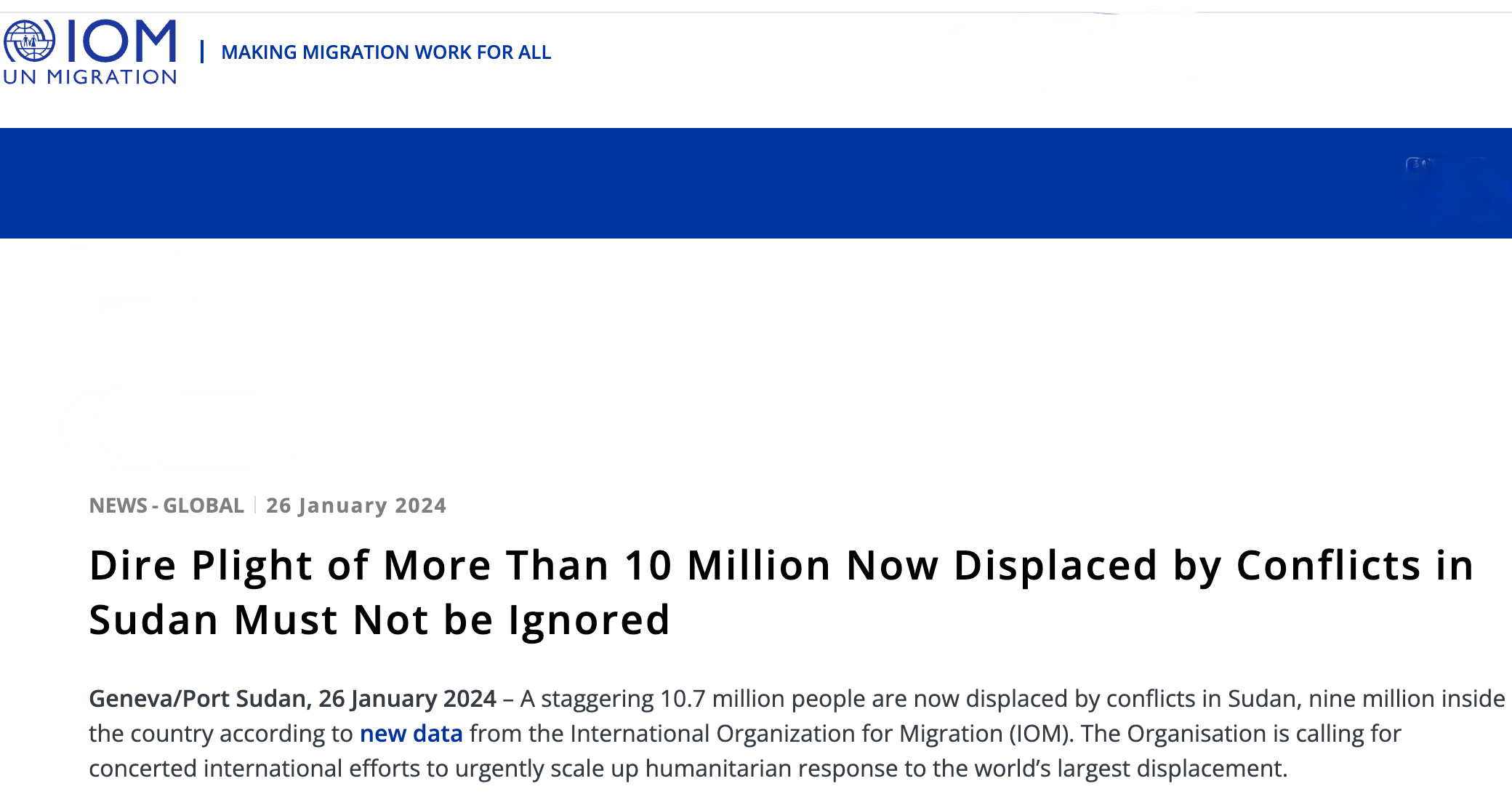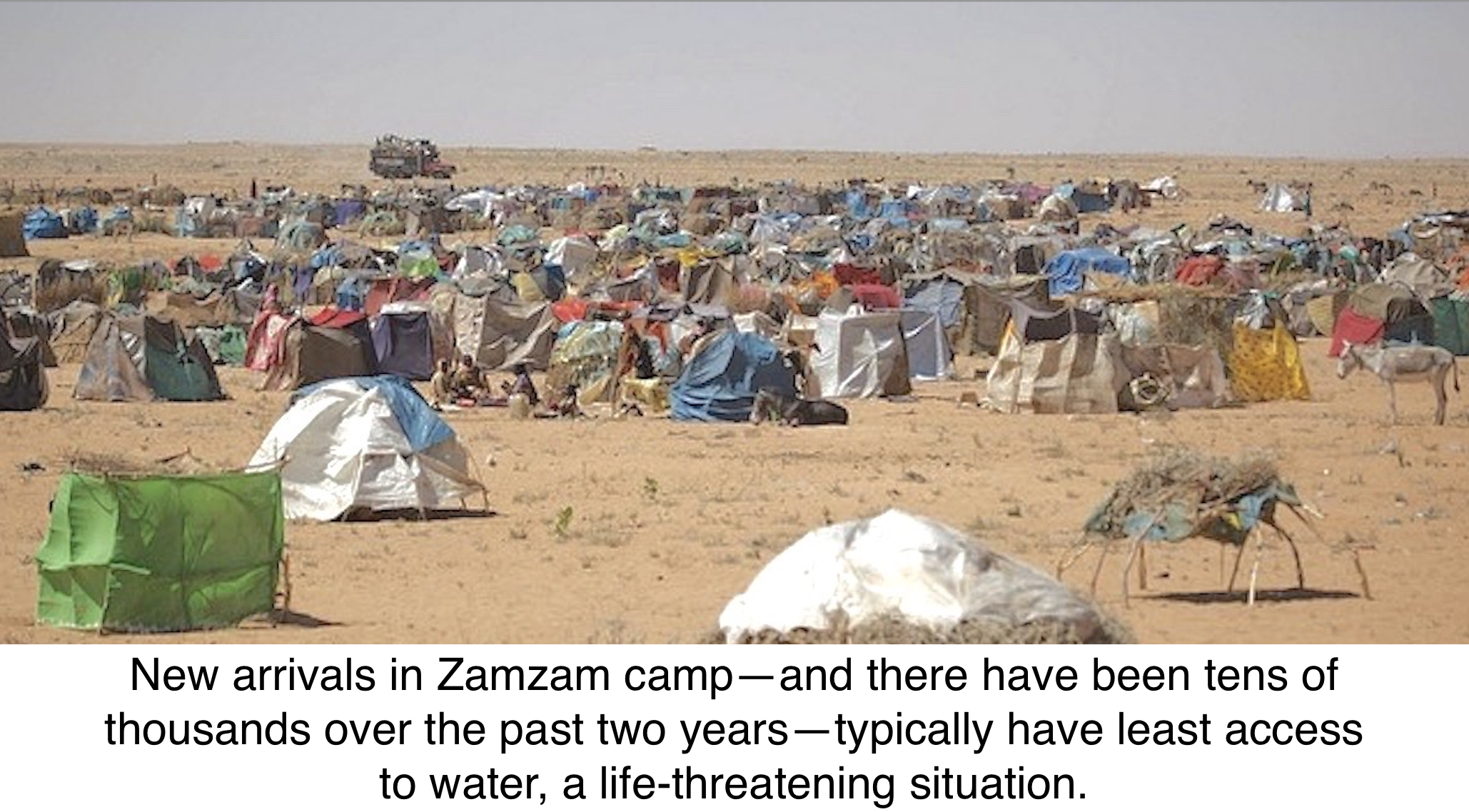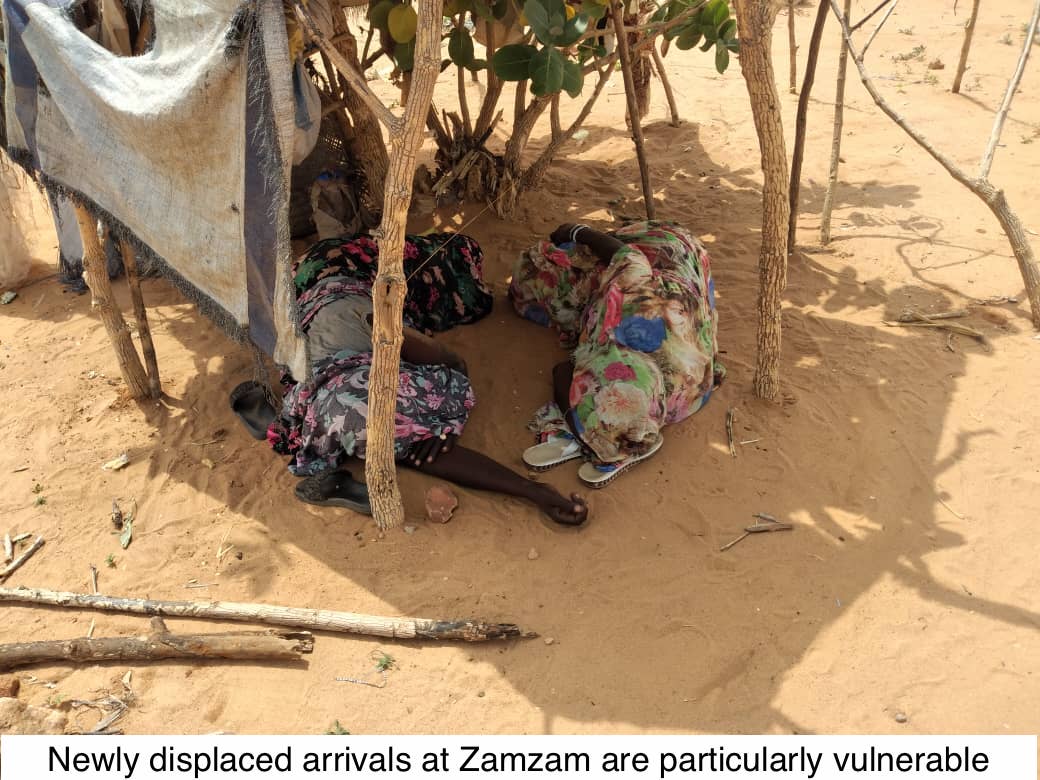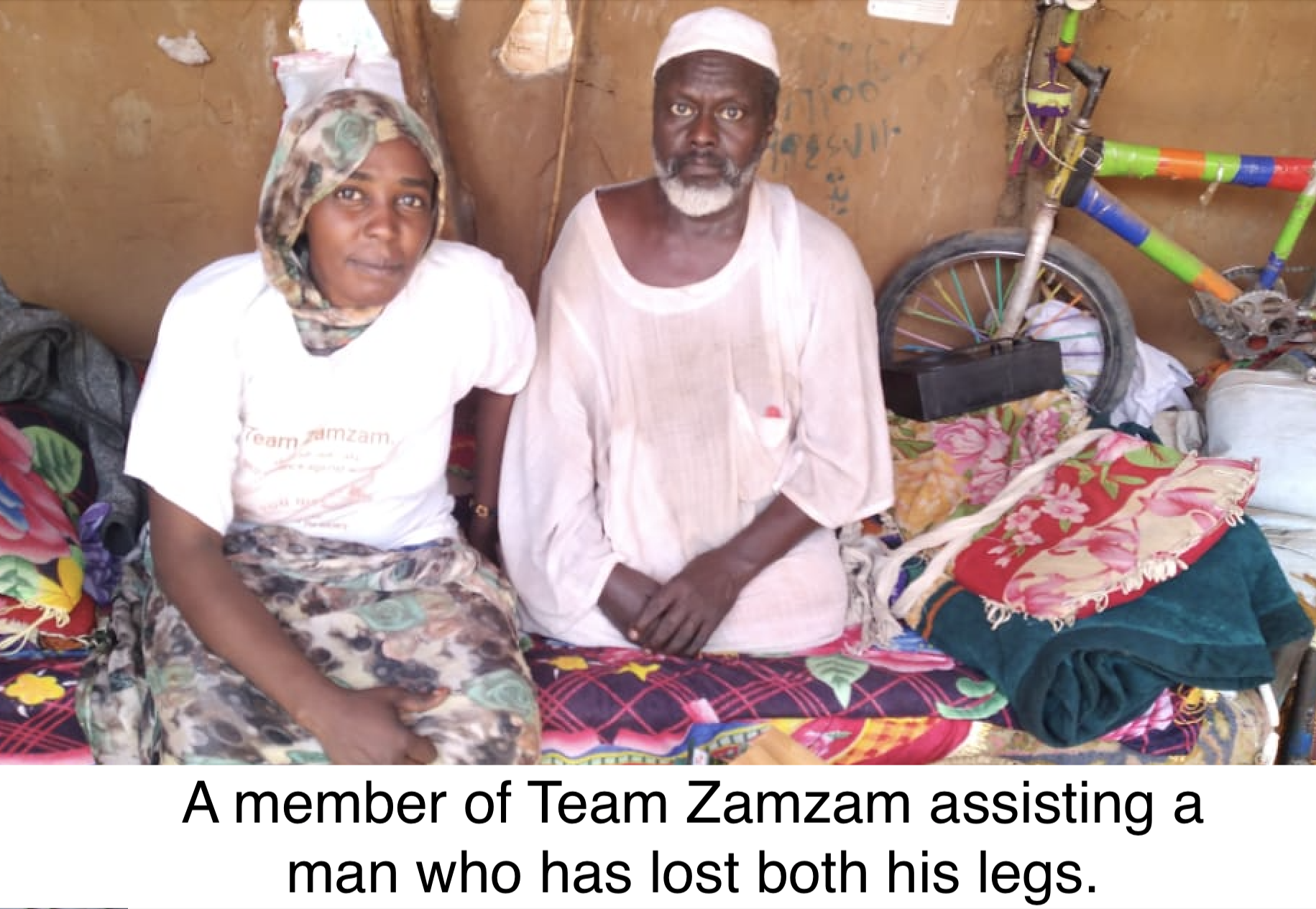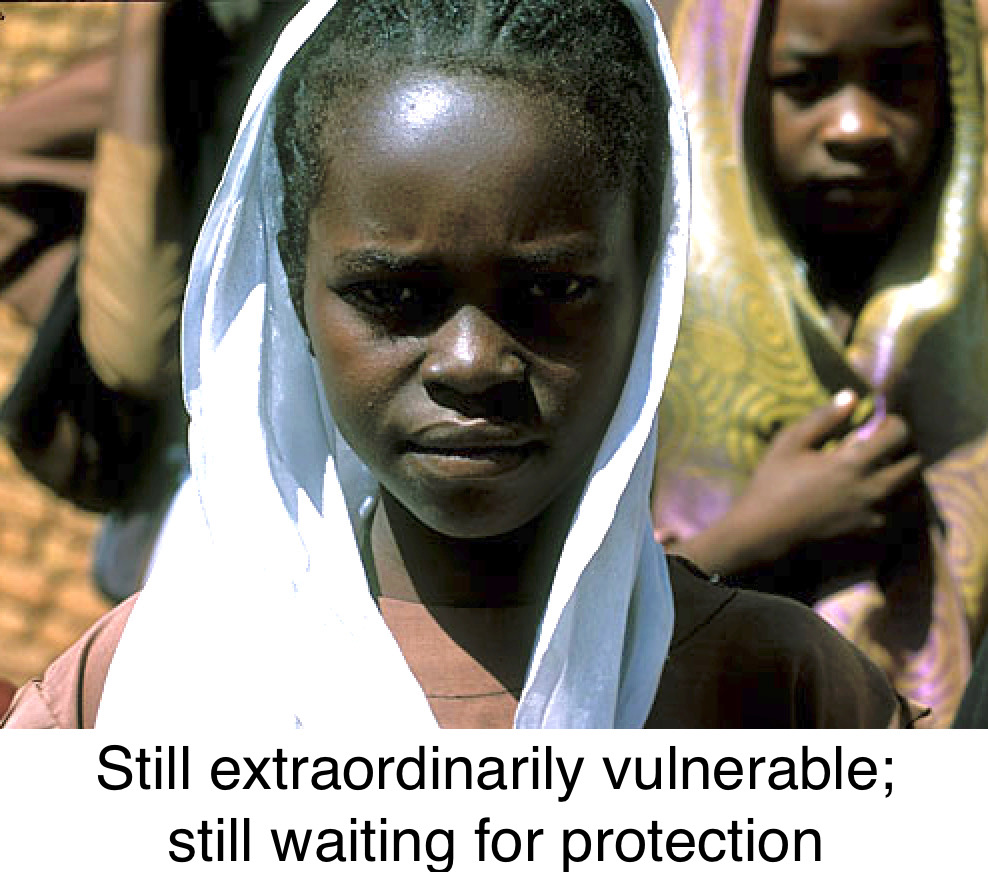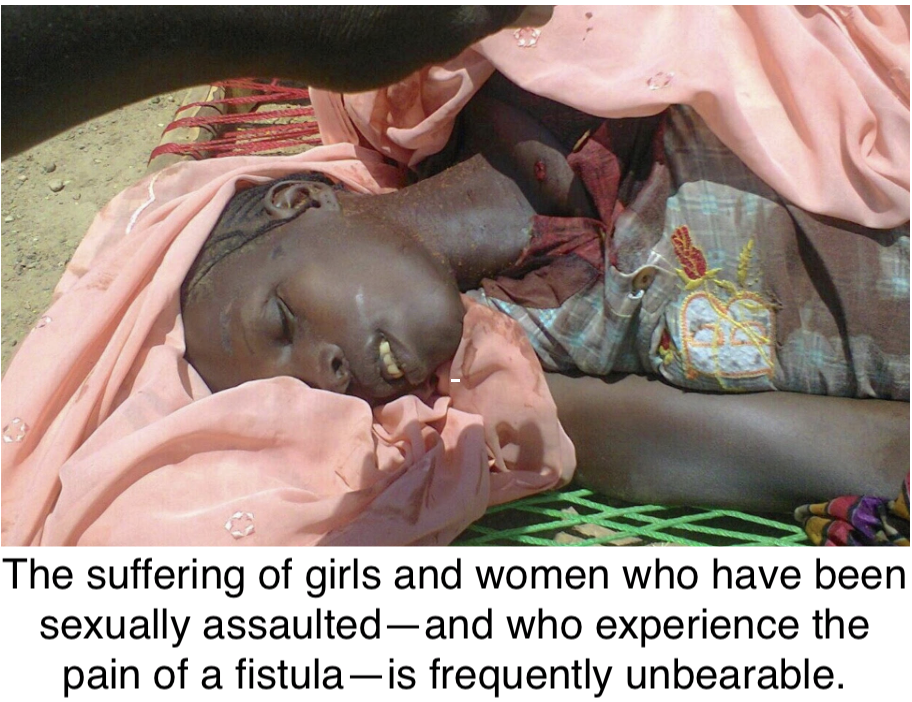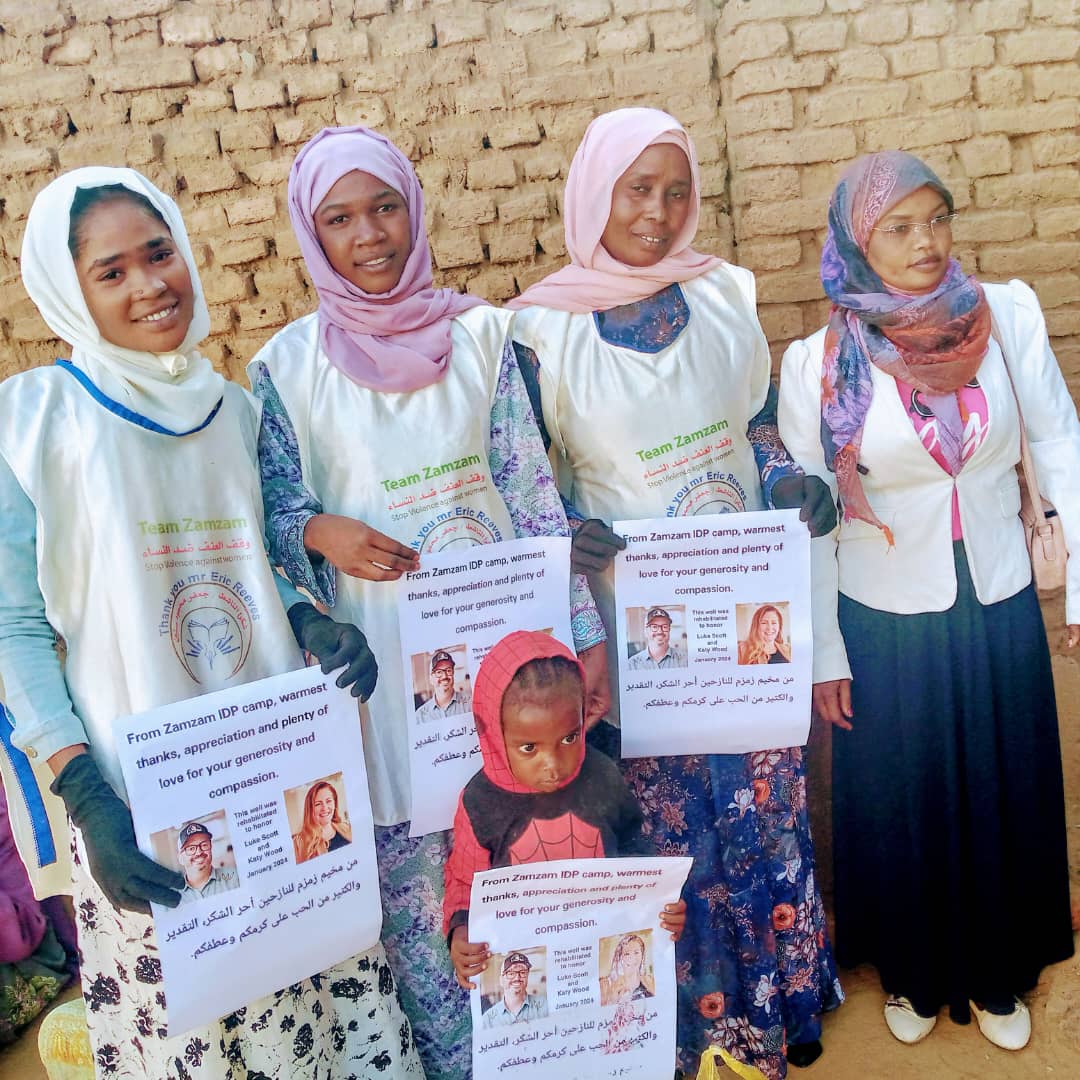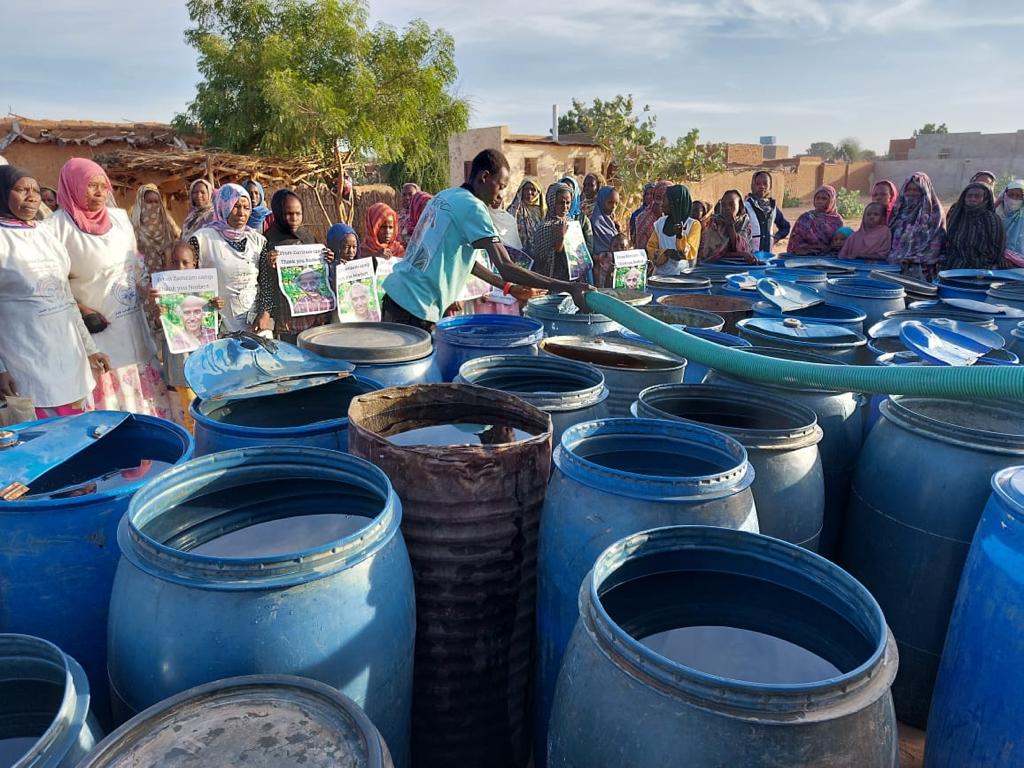
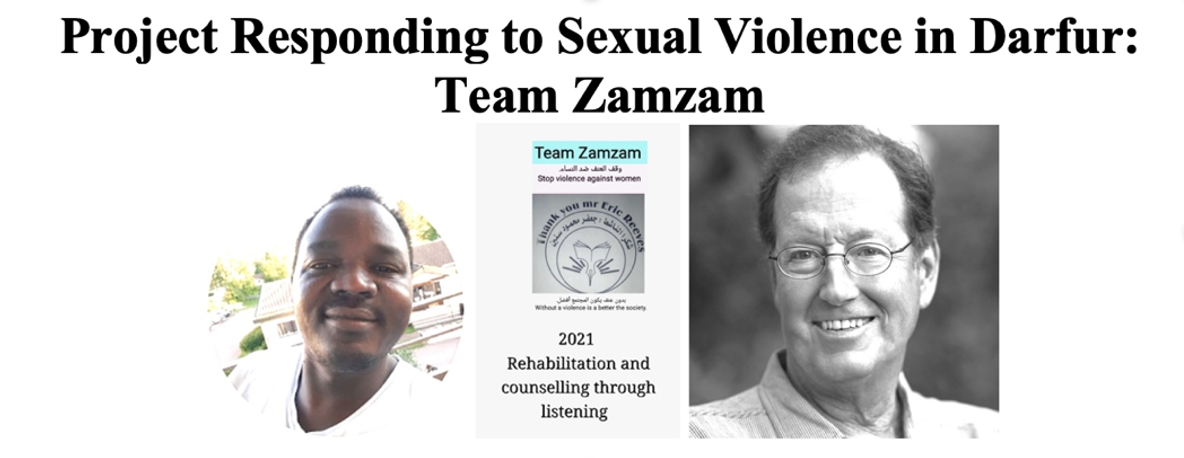 Gaffar Mohammud Saeneen and Eric Reeves, Co-Chairs
Gaffar Mohammud Saeneen and Eric Reeves, Co-Chairs
Nancy Reeves, Editor and Funding Advisor; Julie Darcq, Online Campaign Coordinator
Overview (Eric) Medical circumstances prevent my providing a reporting context and background for this month’s update on our project in Zamzam camp for internally displaced persons. Even so, the full report from the coordinating counselor of Team Zamzam (below) by itself provides an appropriately grim overview of life in Zamzam and North Darfur generally. Indeed, her account provides critical context for what is occurring throughout Darfur and much of Sudan. Famine seems inevitable for large pockets of the civilian population, and disease will run rampant with the collapse Sudan’s health system. I provide limited interpolated comments as well as some telling photographs. A larger than usual number of photographs has also been included, showing some of the extraordinary work of Team Zamzam. Fuller context may be found in recent monthly Updates.
Monthly report for January 2024 (through Jan 25), from the coordinating counselor of Team Zamzam, North Darfur
The deteriorating humanitarian conditions in Sudan, especially in Darfur, have been evident since the beginning of the war that began in April 2023. It is difficult to convey in words how dire these conditions are, and how difficult life has become. Although the people in Darfur suffered from the former Sudanese regime throughout their lives, the recent war taking place between the army and Rapid Support Forces (RSF) militia in cities, states, and the national capital, has become a terrible new tragedy for the Sudanese people. Death rates are high; violence has forced millions to flee their homes [the latest UN figure for displaced persons is over 10 million, the largest IDP population in the world—ER]—and to become refugees in neighboring countries.
This war has created a bleak and extremely dangerous reality for those in camps for displaced persons. Most of these people are paying a heavy price today, even as they are among the poorest and most needy groups. They suffer greatly from a lack of food, medicine, clothing, water, and shelter tents. In turn, this shortage has led to psychological breakdown, depression, social tensions, and an increase in the number of deaths per day. This war, with the use of heavy weapons among civilian populations, has created additional threats to human life—not only death and displacement, but also the birth of deformed children, in addition to an increase in miscarriages among women.
The security situation around North Darfur state
The Janjaweed militias, known as the Rapid Support Forces, have imposed their control over several cities, towns and villages in South Darfur, East Darfur, West Darfur and Central Darfur. Hundreds of thousands of citizens, in particular residents of camps for displaced women and children, have fled to neighboring countries or to camps near the capital of North Darfur. Today, El Fasher, the capital of North Darfur, has become an isolated island; and the camps of Abuja, Nafasha and Zamzam have become even more crowded with newly displaced people—these in addition to the residents of the neighborhood northeast of the city of El Fasher.
Among these newly displaced people, there are many victims of random firearm injuries, both serious and minor; victims of sexual violence; violence and the number of deaths are increasing daily. Because of continued random shooting and the looming terror posed by RSF militias, much of the population of North Darfur state has fled to displaced camps outside the cities. Indeed, even residents of El Fasher have fled southwest to Zamzam camp. Those with the financial means left the city, heading far to the north of the state, including Al-Tina locality on the Sudanese-Chadian border. Others have migrated to neighboring countries in search of a better life, security, safety and stability.
The overall situation in the country, especially in Darfur, is getting worse every day. Life for the displaced has become very difficult, with the constant lurking danger of violence, murder, rape, and displacement. The state has become like a jungle of brutal animals without a shepherd, without a ruler; and there is no mercy in the souls of the people responsible for this violence.
The humanitarian, economic, and social conditions in Zamzam camp
Living conditions in Zamzam continue to deteriorate with the fighting that North Darfur state has witnessed since the beginning of the war, and if we look at the living situation inside the displacement camps and the state conditions as a whole, it is difficult to describe the scale of family tragedies and the depth of their grievances.
[1] Residential sites for displaced people:
Institutions have been established for educational purposes: schools, clubs, children’s centers, and food distribution centers. Inside these institutions there are fixed and non-fixed rooms, and the area of each room is 3 x 5 meters; this provides not nearly enough housing for all the newly displaced people. More than 10 families live inside each room, most of them with young children under 5 years old. The situation is very difficult in residential areas.
[2] The condition of the population inside the shelter centers:
Not only are the living conditions miserable, but there is simply not enough residential space for all the displaced people. There are also a number of cases within the community where people suffer from chronic diseases, others suffer from psychological illnesses, and others have disabilities—and all are crowded within one place.
[3] Means of making a living inside IDP shelters:
Since the war began in Sudan, the remaining resources, if any, have completely disappeared. The simple opportunities that the displaced had previously enjoyed have all collapsed: there is a complete absence of livelihoods, agriculture, trade, jobs—there is desolation. Most of the recently displaced people who came from South Darfur, as well as the long-term displaced people in North Darfur and El Fasher, rely either on begging from markets or from charitable people and extended family members. The absence of humanitarian organizations and the failures of the State government have made the lives of the displaced even more difficult.
[4] Health conditions inside displacement camps in North Darfur
The lack of security has contributed to the absence of basic requirements for life among the displaced; this has inevitably led to severe deterioration in health and well-being. Centers for sheltering newly displaced people have become even more vulnerable to health risks because of overcrowding and limited residential space; moreover, there is a severe shortage of primary health care centers. For example, here in Zamzam there are only three centers and now only one center is in service, which is that of Doctors Without Borders, the rest of the health centers are all out of service.
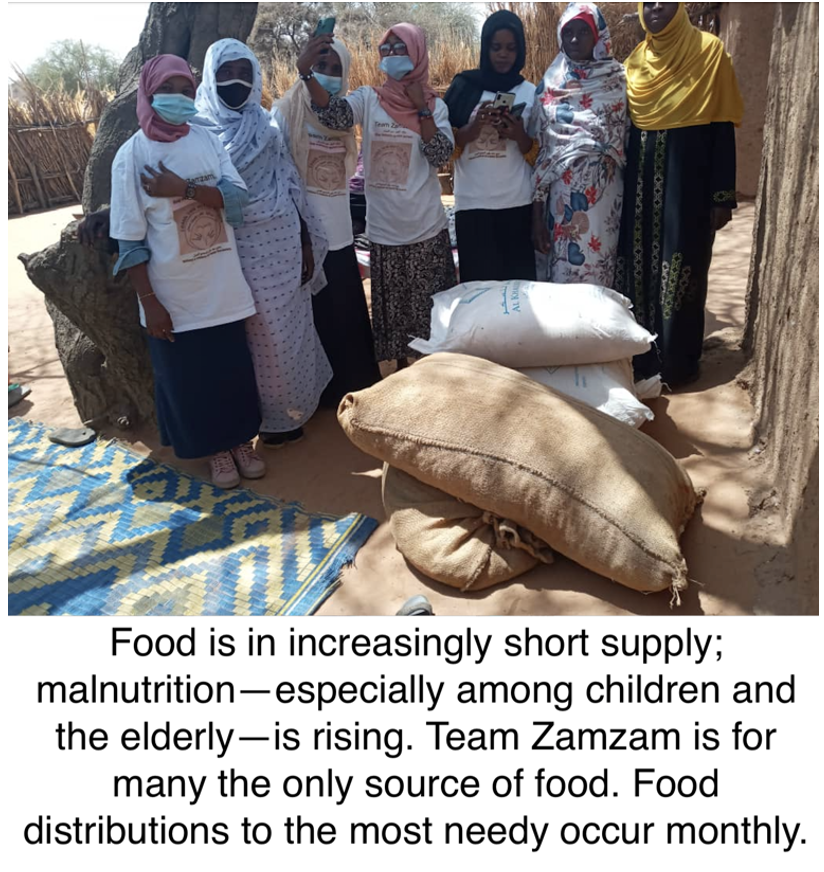 Recently, we have noticed the spread of several diseases caused by disease-carrying insects such as flies, which abound in large numbers, and mosquitoes. There is also a great deal of infectious disease spread by the displaced themselves: conjunctivitis, diarrhea, and typhoid. In addition, there is severe malnutrition among children; gynecological diseases; birth and delivery of deformed children; frequent neonatal deaths; and miscarriages among women. Most hospitals, clinics and health centers were closed for fear of fighting. There are acute shortages of essential medical supplies, and sudden departure of many health professionals because of a lack of security has increased anxiety and psychological instability. As a result of these collapsing health resources, the number of patients suffering from psychological and mental illnesses is increasing dramatically.
Recently, we have noticed the spread of several diseases caused by disease-carrying insects such as flies, which abound in large numbers, and mosquitoes. There is also a great deal of infectious disease spread by the displaced themselves: conjunctivitis, diarrhea, and typhoid. In addition, there is severe malnutrition among children; gynecological diseases; birth and delivery of deformed children; frequent neonatal deaths; and miscarriages among women. Most hospitals, clinics and health centers were closed for fear of fighting. There are acute shortages of essential medical supplies, and sudden departure of many health professionals because of a lack of security has increased anxiety and psychological instability. As a result of these collapsing health resources, the number of patients suffering from psychological and mental illnesses is increasing dramatically.
The distribution of food supplies inside shelter centers
Through our visit and follow-up to the newly displaced people who were displaced from the state of South Darfur (Nyala) and those who were displaced from the state of North Darfur (the northeastern sector, and the Nafasha, Abuja, Khartoum, Kutum), we found many shelter centers whose conditions were extremely difficult.
For January, we targeted two centers for food assistance: Al Salam 44 and 45 (Abu Bakr School) and Al Salam School 56, Al Tawila Gate, where we found those most desperately in need of humanitarian assistance. Types of food items distributed to these desperately needy families: sugar, flour, pasta, red lentils, oil and bars of laundry soap.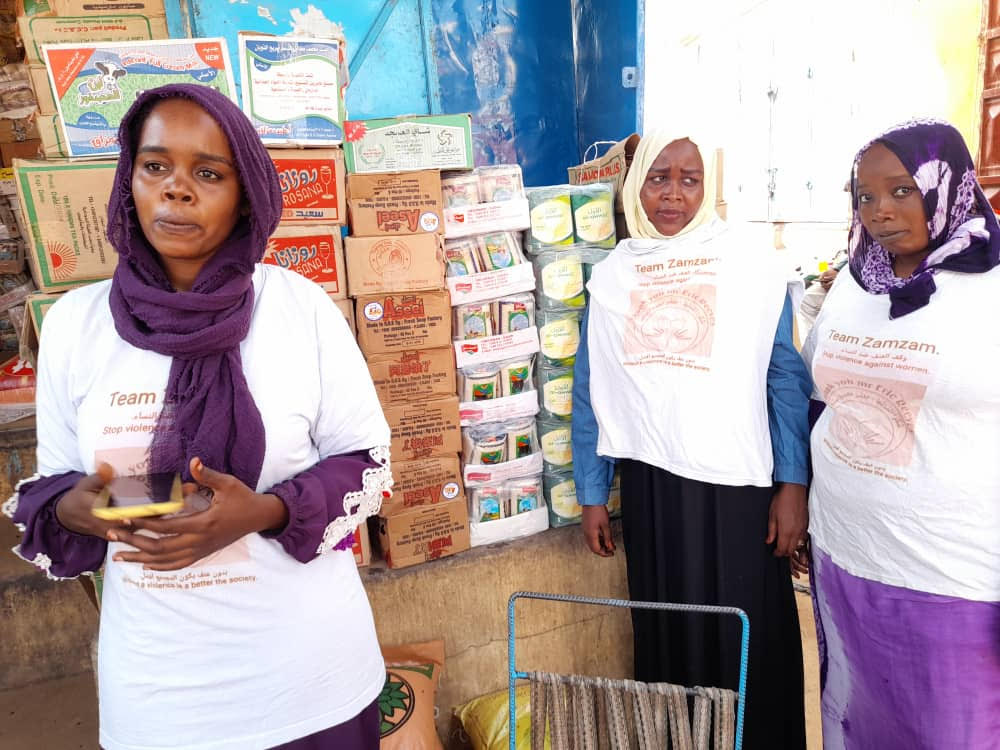 These two centers host very large numbers of displaced people. Abu Bakr School has 793 families from various states:
These two centers host very large numbers of displaced people. Abu Bakr School has 793 families from various states:
* Khartoum State: 59 families
* Nyala: 659 families
* El Geneina: 15 families
* Kass locality: 23 families
* Kutum locality: 6 families
* Zalingei: 16 families
* Kaboun locality: 3 families
* El Obeid: 11 families
793 families in total
Testimonials from beneficiaries inside shelter centers for displaced people.
A young woman from a shelter center in Abu Bakr School said, “We were on the verge of a slow death from hunger, but today, thanks to Team Zamzam we are fine.” She expressed her thanks and appreciation to everyone who contributed to this food program, helping her, other the weak families, the elderly, and the disabled, many of whom have nothing to eat. She continued, saying, “The living conditions here in the camp are very difficult, and from the time we arrived at this center until now, we have not been able to obtain any humanitarian aid. The exception is the charitable aid we received today from Team Zamzam. I am very happy because many families are rescued by starvation.”
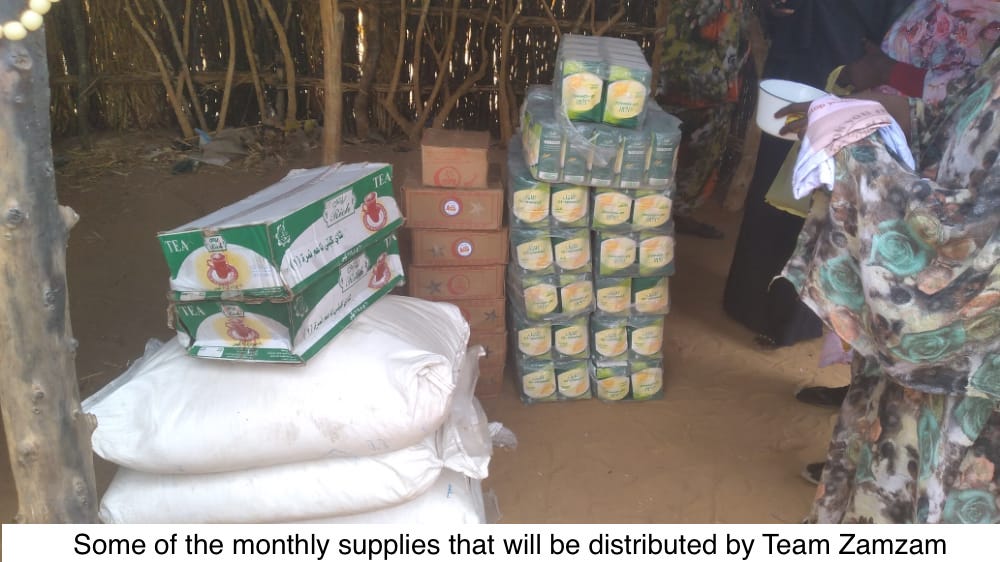 For her part, Mrs. Buthaina Muhammad from the shelter at Umm Shajaira Boys School, said that she is thankful and appreciative of this beautiful humanitarian work that helped her to receive lunch for her and her children: “We are suffering from the terrible living conditions and shortages of food, water, and medicines. The absence of a response from the state and national government is making the situation worse every day.”
For her part, Mrs. Buthaina Muhammad from the shelter at Umm Shajaira Boys School, said that she is thankful and appreciative of this beautiful humanitarian work that helped her to receive lunch for her and her children: “We are suffering from the terrible living conditions and shortages of food, water, and medicines. The absence of a response from the state and national government is making the situation worse every day.”
After Team Zamzam’s distribution of basic necessities, another woman spoke on behalf of the displaced people of Zamzam camp about how they were displaced from other states. She said that they were subjected to beatings, various types of violence, and some of their relatives were killed by the Rapid Support Forces. In addition, she said that they lost all their possessions and homes, fleeing in fear of this brutal militia force.
Testimonies of victims of sexual and physical violence
On Thursday, January 4, 2024, sexual and physical violence was directed against four victims by the Janjaweed militia about 8 kilometers west of Zamzam camp. Four girls from Zamzam section A went out of the camp to bring firewood. At about eight o’clock in the morning, with the weather getting cold the girls left the camp, and shortly after arriving at the firewood site, around ten o’clock, the girls began collecting firewood from a specific place near each other, and suddenly members of the Janjaweed appeared who were on their way to steal or steal something from the neighboring villages.
The coordinating counselor, like virtually all in Zamzam camp, conflates “Janjaweed” and “Rapid Support Forces,” the latter an augmentation of the former and formally created in 2013—headed then and now by Hamdan Dagalo (Hemedti). Hemedti—during the period following his appointment by then President Omar al-Bashi—has been responsible for countless atrocity crimes throughout Darfur, crimes that in aggregate were genocidal in nature. Hemedti now is vying the regular Sudan Armed Forces for control of the entire country—ER]
After one of the girls heard the sounds of people riding horses moving towards them, she yelled to the rest of the girls immediately to gather in one place to decide how to escape. But they were attacked before they could escape. After surrounding the victims, the militiamen gathered them and put them in a queue so that everyone could choose according to his mood, and they began various acts violence. These included verbal abuse and questions such as: “Why won’t you give me your mobile phone?” “Where are you from?” “What is your tribe?” “What is your price if we take you hostage?” “Where is your husband?” During this time, the victims were subjected to beatings and sexual violence, and eventually ended up being left naked in the cold weather.
Samira M.M., one of the four victims, said, “After he tore my underwear violently and entered part of my body [a euphemism for rape—ER], he started laughing hysterically and slapping me in the face and verbally abused me with all forms of racist terms.”
After that, they ran as fast as they could until they reached Zamzam camp, and the girls’ families learned about it. But they refused to go to the police station to open a criminal file saying that they lost confidence in any authority.
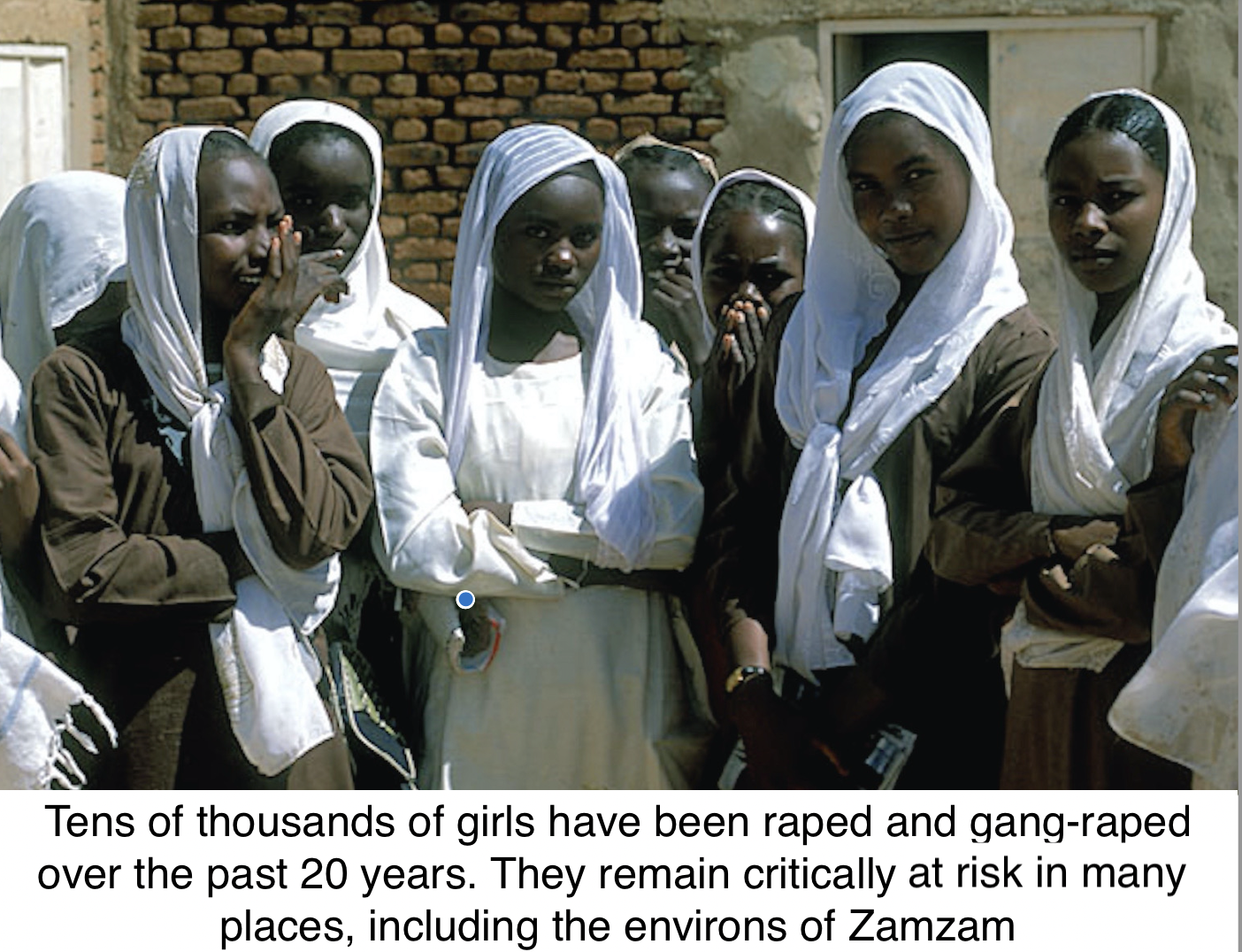 People fail to file criminal reports following such attacks because there are recent precedents that discourage people: the police for their part won’t do anything. And since the war began in April 2023, the police have become unable to defend even themselves from the militias. Since the events described above, two of the families of the four victims have contacted Team Zamzam counselors seeking help; the counselors responded and are now doing everything in their power to help them.
People fail to file criminal reports following such attacks because there are recent precedents that discourage people: the police for their part won’t do anything. And since the war began in April 2023, the police have become unable to defend even themselves from the militias. Since the events described above, two of the families of the four victims have contacted Team Zamzam counselors seeking help; the counselors responded and are now doing everything in their power to help them.
Other work and activities carried during January (through January 24)
Counseling:
28 individual counseling sessions were conducted
17 group counseling session were conducted
3 fistula patients have been accompanied to clinics for medical treatment and consultation.
In the first week of January, a new water well was repaired and named after Luke Scott and Katy Wood.
[This is the seventh water well that has been rehabilitated by Team Zamzam, a critical achievement given the growing water shortage throughout Darfur—ER]
24 routine visits were carried out in the four sections of the camp as well as six shelter centers in neighbourhoods of southern El Fasher, to inspect conditions, take notes, and distribute necessities.
Accompanying a total 51 patients, most of whom are children and women suffering from various diseases, to different hospitals and clinics for treatment.
6 training workshops were carried out to strengthen the competence of team Zamzam volunteers.
[This growing use of volunteers has greatly expanded the reach and effectiveness of Team Zamzam—ER]
4 meetings were carried out with different representatives of new shelters, these in various shelter centers, to listen to their concerns, opinions, and urgent needs.
How to Help
Assistance is urgently needed and will be greatly appreciated by Team Zamzam, and by the girls and women whose suffering they seek to alleviate. The distribution of food and medicine presently comes as many within the camp daily move closer to starvation. Here I should also stress the tremendous efficiencies of purchases by a staff with local knowledge, as well as the value of their deep understanding of where need is greatest within this vast camp, swollen with recent displacements caused by insecurity.
NB: It is now possible to make a tax-deductible contribution to our project, using a portal on the website of a 501/c/3 organization operating in Sudan. Operation Broken Silence, working primarily on health and education issues in the Nuba Mountains of South Kordofan, has created a special site for a tax-deductible contributions to our project, and we hope this makes contributing to the health and well-being of girls and women in Zamzam easier for donors.
We also hope that all will keep in mind our project as a whole operates with truly extraordinary efficiency, in ways matched by no humanitarian organization operating in Darfur that I am aware of, a region I have been researching for two decades. There is absolutely no overhead for this project.
Those wishing to assist in funding the work of Team Zamzam may also send a check directly to Eric (Eric Reeves, 31 Franklin St., Northampton, MA 01060)
OR
Purchase one of his woodturnings: https://www.ericreeves-woodturner.com/gallery
100% of the purchase price of every woodturning directly supports the project in Zamzam.
*******************
Previous updates are archived at: https://www.ericreeves-woodturner.com/blog/
A “You Tube” video of Eric describing the project can be found at: https://youtu.be/QsRUa7GoVgY
